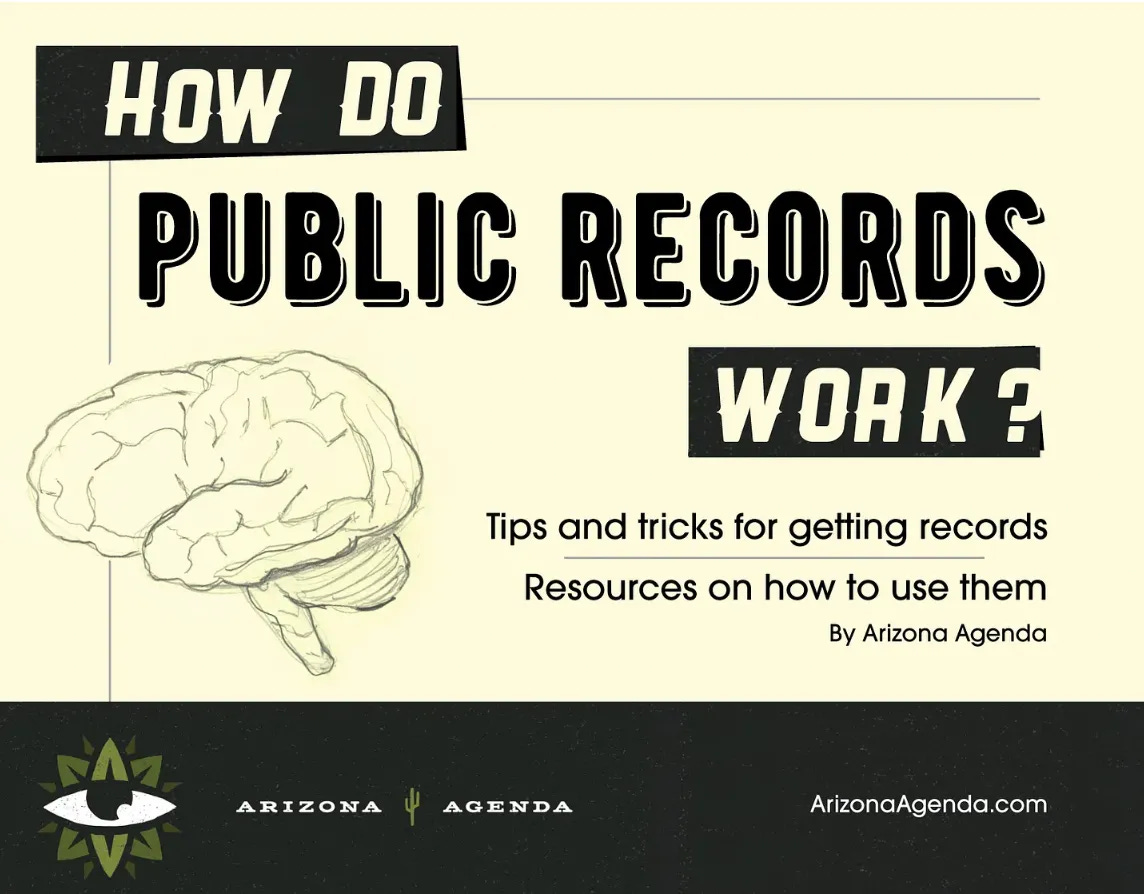Fun with public records
Eight questions on public documents … All your borders belong to us … And one of God's own prototypes.
Sure, most people know that local government has to keep records, and that the records should be, in most cases, open to public inspection.
But in practice, getting public records is far more complicated.
With Project Blue still fresh in our collective minds, now feels like a good time to dive into the nuanced nature of public records in Arizona — what the Arizona public records law covers, what it doesn't and why you'll often have to fight for documents that clearly fall under the scope of the law.
Many in the media and activist spaces are still waiting for Tucson and Pima County to release records about the proposed massive data center in our backyards. And the single most important disclosure — a document naming Amazon Web Services as the end user — was only released as an “accident.”
While the document that could be covered by that darn non-disclosure agreement the county signed with the world’s largest retailer has been disclosed, other county documents about Project Blue — presumably containing much less sensitive information — haven’t been released to the public.
Today, we’re going to pivot from our usual format to a quick quiz on Arizona public records laws (we’ll post the answers tomorrow).
And if you'd like to study up a little before the quiz, our sister newsletter, the Arizona Agenda, created this handy 'zine about how to request public records.
Before we get started, you'll have to forgive us for the brief flash of imposter syndrome — we are constantly reminded that we are not lawyers. But we know the underlying laws well, and records must be released promptly.
Sadly, “promptly” is poorly defined here in Arizona. It often requires attorneys.
There are laws allowing agencies to meet in secret with their attorneys, known as an executive session, which creates another set of documents that can’t be disclosed.
Not to mention voluntary non-disclosure agreements with third parties, but that practice is being scrutinized heavily here in Tucson.
As you’re about to see, what appears simple on the surface is actually a labyrinth of nuanced situations, along with officials who’d really rather not make it easy for the public to know what they’re up to.
Ok, enough talk. On to the quiz. Click the image below to start.
Smile and waive: Lawyers for Homeland Security head Kristi Noem argue she can build 40 miles of new southern Arizona border wall despite environmental concerns because federal law lets her “waive any legal requirements to ensure expeditious construction of border barriers and roads,” Capitol Media Services’ Howie Fischer reports. The Arizona Center for Biological Diversity and CATalyst are suing to stop construction, and their attorney called the border wall project “the death knell for jaguars in the United States.”
Cold cases, hot confession: Attorney General Kris Mayes announced that Paul Eppinger, the head of the Arizona Mexican Mafia, confessed to being involved in five cold case murders while he was being investigated for pandemic unemployment relief fraud. He’s currently serving a life sentence in federal prison, and got 25 years for each homicide tacked onto his sentence.
Gutting the garden: President Donald Trump’s budget cuts are now threatening South Tucson’s Garden Kitchen, a community health program that relies on expiring SNAP-Ed dollars, the Republic’s Clara Migoya reports. Neighbors bought the property 14 years ago to keep a motorcycle gang club from buying it instead, and now, Garden Kitchen is losing half its staff and ending weekly work with early-childhood centers and senior centers. (That was the fate we were worried about when we wrote about the garden back in June.)
If you wouldn’t take nutrition advice from the Hell’s Angels, don’t get your local news diet from Facebook. Support local news instead.
The cancer clause: The Tucson City Council approved two firefighters’ workers’ compensation claims for cancer treatment after they were originally denied, the Daily Star’s Charles Borla reports. The council also amended city policy so that any adenocarcinoma diagnosed in police, firefighters or fire investigators will now be automatically treated as job-related.
Red alert: TUSD is giving its 6,000 employees wearable panic buttons they can push to let law enforcement know their locations and activate strobe lights on campus, KVOA’s Jafet Serrato writes. It will cost the school district about $1 million annually.
Yesterday, the Tucson City Council said goodbye to longtime City Attorney Mike Rankin.
Everyone had incredibly gracious words for the retiring legal pro.
But in true Tucson fashion, it was a somewhat weird goodbye — at one point, Councilman Paul Cunningham choked up while declaring Rankin is such a staple in the community that his name is actually one word that serves as a name and a title: MikeRankin. (Cunningham then made the crowd holler back “MikeRankin!” every time he said the name.)
But the best ode to Rankin came from Councilman Kevin Dahl, who imagines Rankin as his own Dr. Gonzo.
For those of you who don’t get that reference, we’ll let Dahl explain.
“Every so often, I imagine I’m in a remake of the movie ‘Fear and Loathing in Las Vegas’ and I’m driving to Las Vegas in an open coupe having done a lot of drugs and my lawyer is sitting next to me doing the same thing,” he said. “Nothing to do with reality, by the way, but that’s how I imagine Mike Rankin.”
Now that’s a lawyer you can trust.
And for the record: Mike, if you wanna take a road trip, just let us know.








Frau Noem is not worth one of our Jaguar’s whiskers! Thanks to the Daily Star for the image .of one of our rare Jaguar visitors.